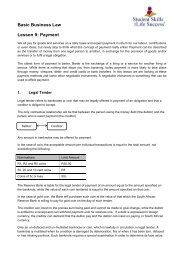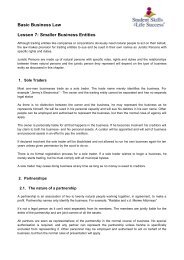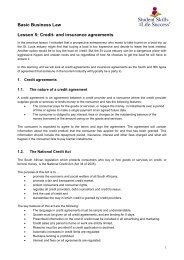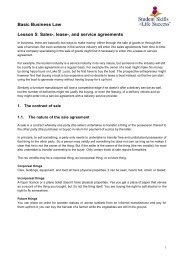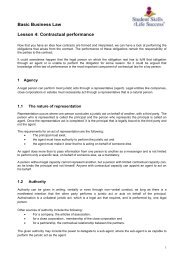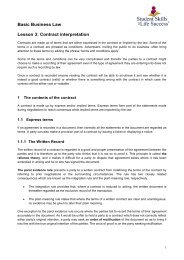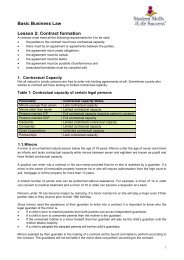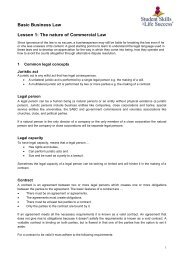Basic Business Law. Lesson 8. Companies
This is the eighth lesson of the "Student Skills for Life Success" "Basic Business Law" course. The topics covered in this booklet are: 1. The nature of a company 2. The Companies Act 3. The Companies and Intellectual Property Commission 4. Types of companies 5. Forming a company 6. Trading as a private company 7. Shareholder meetings 8. Duties and rights of directors 9. Private companies in financial distress
This is the eighth lesson of the "Student Skills for Life Success" "Basic Business Law" course. The topics covered in this booklet are:
1. The nature of a company
2. The Companies Act
3. The Companies and Intellectual Property Commission
4. Types of companies
5. Forming a company
6. Trading as a private company
7. Shareholder meetings
8. Duties and rights of directors
9. Private companies in financial distress
You also want an ePaper? Increase the reach of your titles
YUMPU automatically turns print PDFs into web optimized ePapers that Google loves.
The appointment of the auditors requires only an ordinary resolution. Only 40% of<br />
the voting rights are being exercised. The rule states that 51% of the voting rights<br />
being exercised must be in favour of the resolution in order for it to pass.<br />
In this case that means that 3 of the four shareholders present must be in favour (i.e. 75%) as 50% (i.e. 2 out<br />
of four) will not be enough to pass the resolution.<br />
<strong>8.</strong> Duties and rights of directors<br />
Directors are required to disclose any “personal financial interests”. They may not use their position as<br />
director or information gained as a director to make a secret profit or gain advantage for themselves or<br />
someone else or to cause harm or detriment to the company.<br />
The Act deals comprehensively with the election, disqualification, vacancies, removal, meetings, resolutions,<br />
and liabilities of directors.<br />
The common law is and remains the primary source of director’s duties. Although, in practice, the MoI<br />
prescribes the extent of the directors' powers and a director who acts outside the ambit of the MoI will be<br />
answerable to the company for his conduct. The function of the law is to supplement and add detail to the<br />
responsibilities of directors as contained in the MoI and to deal with areas on which the MoI is silent.<br />
At common law a director owes two types of duty to the company, a fiduciary duty and a duty of skill and<br />
care.<br />
<strong>8.</strong>1. The fiduciary duty of a director<br />
A fiduciary is a person who is in a special position of trust. A director is a fiduciary and therefore must act in<br />
good faith in his dealings with or on behalf of the company and he must exercise the powers and fulfil the<br />
duties of his office honestly. A director cannot be relieved of his fiduciary duties by agreement or by any<br />
other means. Any act amounting to an evasion of his duty is seen in the same light as a breach of the duty<br />
itself.<br />
The fiduciary duty has four aspects. Firstly a director has a duty to act in good faith and do what he honestly<br />
believes is in the best interests of the company. Secondly a director must not use his powers for improper<br />
purposes, even if he believes that to do so would be in the best interests of the company. In addition he must<br />
exercise his powers as director for the benefit of the company and for the purpose of which they were<br />
conferred.<br />
Further a director must not put himself in a position where there is an actual or potential conflict between his<br />
duty to the company and his personal interests and lastly a director is regarded as a trustee of company<br />
property, and he must not knowingly participate in or ignore the misapplication of company property.<br />
<strong>8.</strong>2. The director’s duty to display a reasonable level of skill and care<br />
When a director is acting in the company's interests he is to exercise whatever skill he possesses and<br />
reasonable care.










